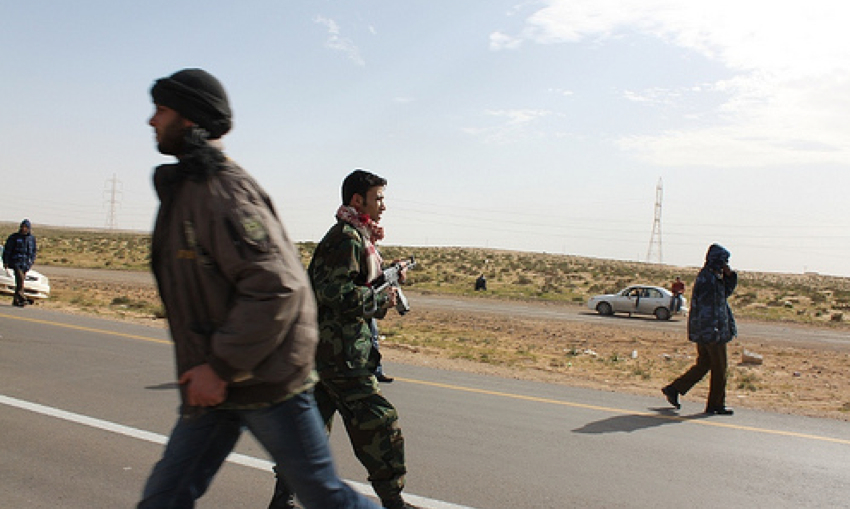The authorization by Security Council of “all necessary measures” to protect civilians in Libya marks the beginning of the end of the Ghaddafi regime. But is it also the beginning of the end for democratic movement sweeping the Arab world?
A popular uprising in Libya morphed into an armed rebellion. In so doing, it has called down the wrath of a murderous dictator. This is not to blame the victims. Ghaddafi was murderous before, during and after the opposition was demonstrating peacefully in the streets. But a strategic choice was made by the Libyan opposition to resort to armed resistance. By all appearances, it was made in the chaotic and ad hoc manner of a movement and a society trying to defend itself against the violence of a repressive state. But it was a fateful moment for democracy in Libya.
Similar choices are being made every day in Egypt, in Tunisia, in Bahrain, in Yemen. The results so far speak volumes about what works against dictators: resorting to armed struggle is to concede the tactical and strategic high ground to whoever controls the government – which is always better armed and prepared, even in the shambles that is the Libyan military. More important, armed violence against the state polarizes the political elites, consolidating the support network around those in power, rather than prying those networks apart. The Egyptian movement did the latter brilliantly. Saudi intervention under a GCC flag is meant to prevent the same kind of defections from the regime breaking out in Bahrain and elsewhere in the Gulf.
Is this an argument against intervention to save lives? No. As Ghaddafi attempts to kill his opponents and buy off the opportunists, we should not stand by. But nor should we pretend that anyone is coming to their rescue. Libyans remain at the mercy of Ghaddafi (Kosovo taught us that you can’t stop atrocities from 15,000 feet). Military intervention will help to ensure against outright defeat of the opposition, and it may hasten Ghaddafi’s departure from power (although that is far more dependent on the opposition than on foreign air power). But there is no guarantee that intervention will defend democrats in Libya.
If history is anything to go by, we can assume that Ghaddafi will remain in power anywhere from 15 months (Milosevic) to 15 years (Saddam). In both scenarios, the Libyan opposition faces a dynamic of insurgency and counter-insurgency for some time to come. They must assume that intervention from above will not depose Ghadaffi, nor will it save the lives of those who live under his control. Most likely the result will be a violent stalemate, empowering the guys-with-guns on both sides and reducing the space for democratic forces.
This reality on the ground will have only passing effect in Washington. There are several reasons for this. One is that there is rarely a fixed solution to which the war planners can apply their phenomenally linear thinking (just saying “Ghaddafi” is not enough). Another is that interventions themselves have massive effects of their own that cannot really be predicted (except to say it will get worse, there will be “blowback”, etc). And, finally, because interveners – whether in Washington or in Riyadh – base their decisions to intervene on political considerations at home and with only passing attention to the considerations in the places in which they are intervening. As a consequence, ‘we’ never ever get it ‘right’ in terms that would be understood by those on the ground (forget Iraq and Afghanistan, the same goes for Somalia, Bosnia, Kosovo, DRC).
What happens next in Libya is anyone’s guess. But one thing is certain: intervention without a political strategy will in the end do more harm than good. The absence of a political strategy that leads out of the present violence will ensure a defeat for democracy in Libya and threaten the movement across the region. With this in mind, democrats in Libya and the region need their own strategy, one that is clearly targeted at regaining political leadership of the opposition (if they ever had it in Libya). This will not be easy to do, but there are signs it has already started (women protest marches in Benghazi for example).
The same goes for those of us who are rooting like mad for the defenders of Benghazi. Some of those in the US most vocal for intervention are those who know the region. This is because they recognise that this is a critical moment, not just for Libya but for the region as a whole and beyond. But we should be careful what we ask for and how we do so. There is never a moral case for intervention. There is no right or wrong here. There is only politics. Intervention is always a question of who wins and who looses. But intervention in the absence of a clear strategy is standard UN and NATO operating procedure. In the absence of a strategy of their own, democrats in Libya may not loose but they are almost certain not to win.
